Unit1-Uni2复习课件38张2021-2022学年牛津译林版八年级英语下册
文档属性
| 名称 | Unit1-Uni2复习课件38张2021-2022学年牛津译林版八年级英语下册 | 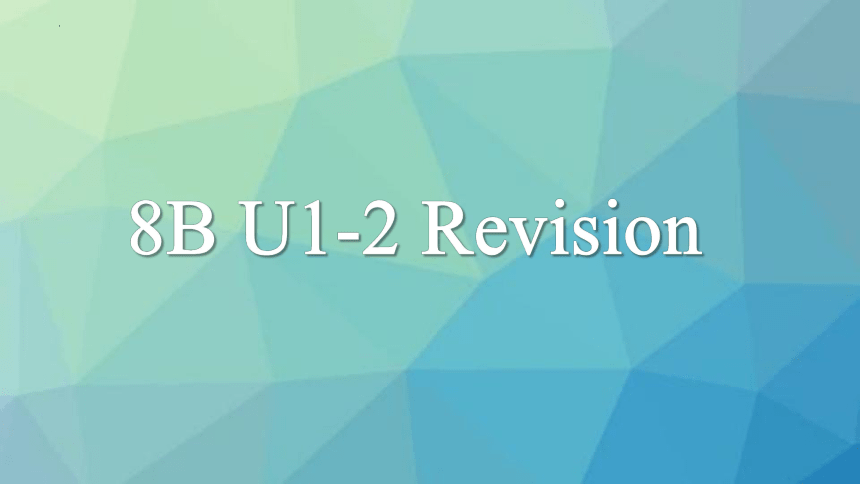 | |
| 格式 | pptx | ||
| 文件大小 | 3.4MB | ||
| 资源类型 | 教案 | ||
| 版本资源 | 牛津译林版 | ||
| 科目 | 英语 | ||
| 更新时间 | 2022-04-16 08:23:58 | ||
图片预览

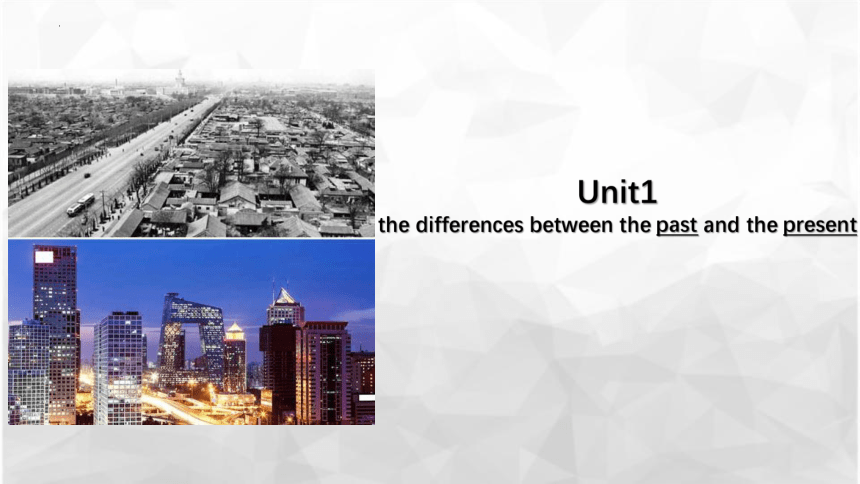

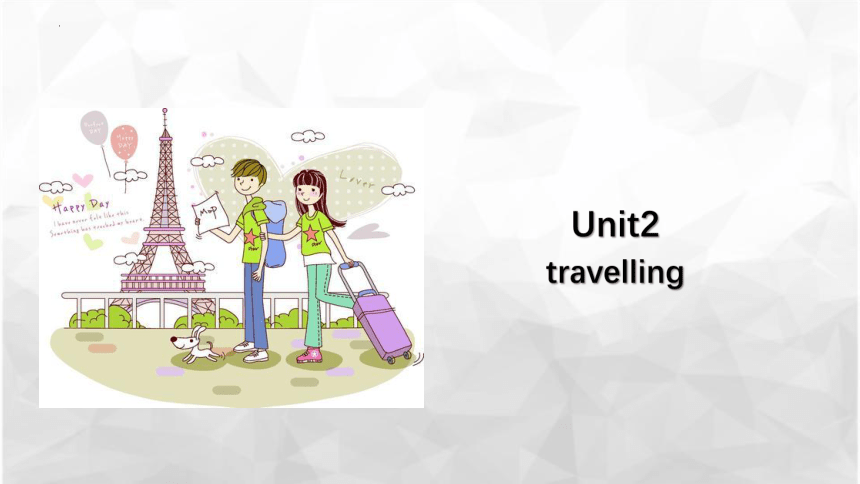
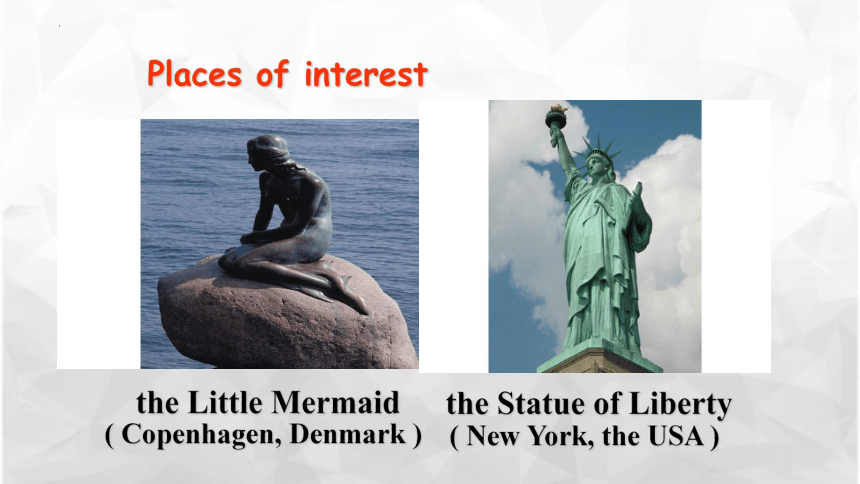
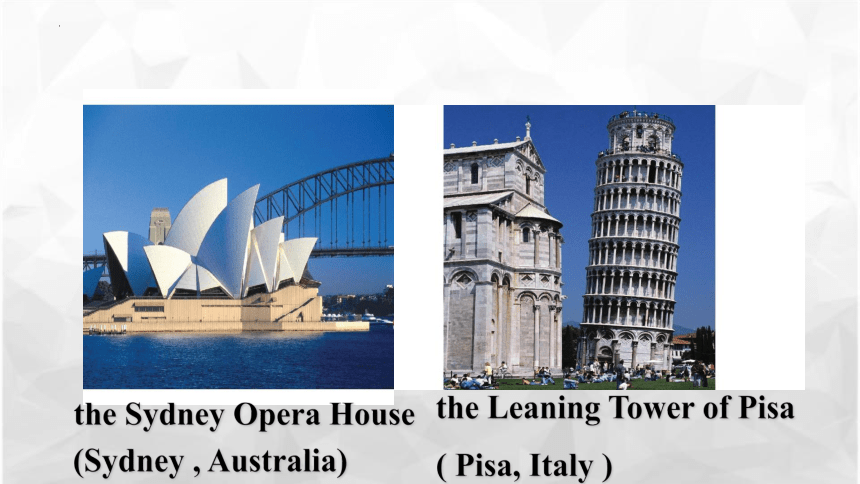



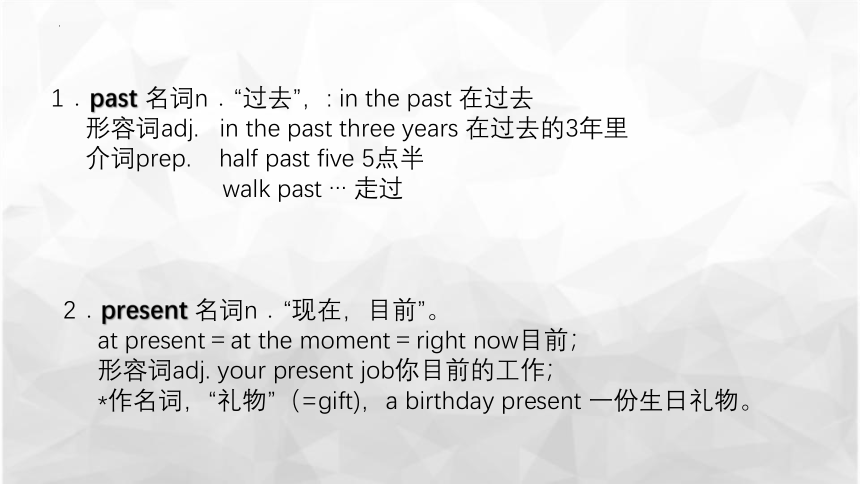
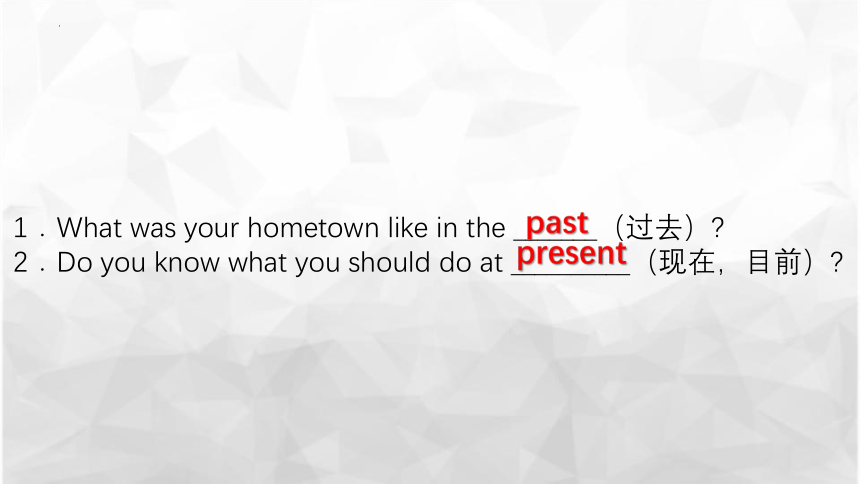
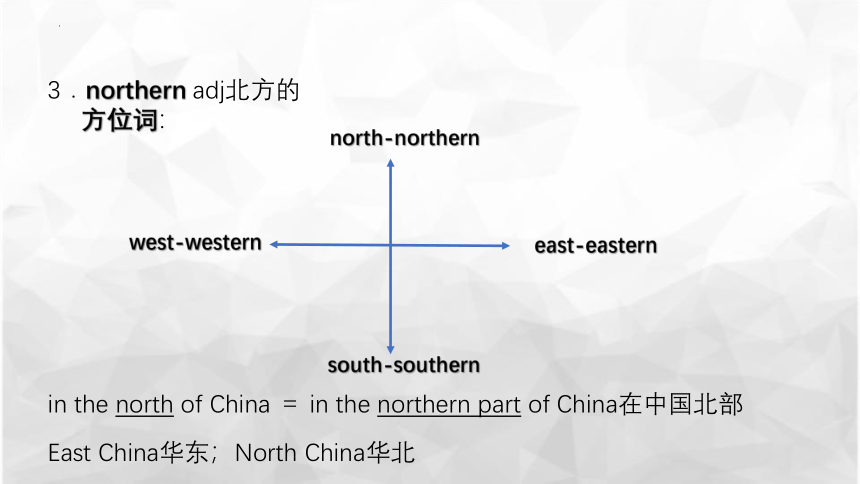
文档简介
(共38张PPT)
8B U1-2 Revision
Unit1
the differences between the past and the present
Transport
Living places
Entertainment(娱乐)
Pollution
Friends
at different times
Unit2
travelling
Places of interest
the Statue of Liberty
( New York, the USA )
the Little Mermaid
( Copenhagen, Denmark )
the Sydney Opera House (Sydney , Australia)
the Leaning Tower of Pisa
( Pisa, Italy )
Tower Bridge
( London, England )
the Great Wall
( Beijing, China )
Hong Kong DisneyLand
Hong Kong Ocean Park
高频词汇
1.past 名词n.“过去”,: in the past 在过去
形容词adj. in the past three years 在过去的3年里
介词prep. half past five 5点半
walk past … 走过
2.present 名词n.“现在,目前”。
at present=at the moment=right now目前;
形容词adj. your present job你目前的工作;
*作名词,“礼物”(=gift),a birthday present 一份生日礼物。
1.What was your hometown like in the _______(过去)
2.Do you know what you should do at __________(现在,目前)
past
present
3.northern adj北方的
方位词:
in the north of China = in the northern part of China在中国北部
north-northern
west-western
south-southern
east-eastern
East China华东;North China华北
Yancheng is in the__________ (north) part of Jiangsu.
northern
4.pollution 不可数名词un.污染
air pollution空气污染;noise pollution噪音污染;light pollution光污染
pollute及物动词vt.,意为“污染”,pollute the air污染空气
polluted 形容词adj., 被污染的, the polluted air 被污染的空气
5.interview n.& vt.
作名词n. “采访,会见”。
作动词vt. “采访,面试”;
interview sb.= have an interview with sb.采访某人
interviewer n.,“采访者,面试官”
interviewee n., “接受采访者,参加面试者”
I think there will be more ___________(污染)in fifty years.
pollution
(2014.镇江)Li Jianrou was _____________ (interview) shortly after she won the first gold medal for China in the 22nd Winter Olympic Games.
interviewed
6. return 动词v.归还,返回。
return sth. to sb. =give sth. back to sb.把某物还给某人。
return本身含有back的意思,不能再和back连用。
return to sp. =come/get back to sp. 回到某处
7. such “这样的,如此的”
such+a/an+adj.+cn.单 such a big house 如此大的房子
such+adj.+cn.复 such kind girls 如此好心的女孩
such+adj.+un. such sad music 如此悲伤的音乐
词组: such as 例如
[辨析] so的用法:
so+adj.+a/an+ c.n.单 so clever a boy如此聪明的一个男孩
so+adj./adv. so clever如此聪明;so quickly如此迅速
so many/much/few/little+n. so many mistakes如此多的错误
8. ride作名词n.,意为“(骑车或乘车的)短途旅程”
an hour’s bus ride 乘车一个小时
Don’t put your head out of the window during the ____________(旅程).
作动词v. 骑(车、马)ride-rode-ridden
ride a bike/a horse
9. couple n. “两人,情侣/夫妇,两件事物,几个人,”
a couple of sb./sth. 一对,几个,几件
a couple of men 两个男人
a couple of years ago 几年前
ride
10. at high speed以高速
The train is travelling at high speed.火车正高速运行。
反义短语是at low speed
The population of China is growing at low speed.中国人口在缓慢增长。
at a speed of…,意为“以……的速度”
at a speed of 180 kilometers an hour 以每小时180公里的速度
11. by the way,in the way与on the way
(1) on the way意为“在途中,在路上”。:
on the way to sp.在去……途中 on the way to the supermarket
on the way home在回家的路上
I had my breakfast on the way.我在路上吃了早饭。
(2) in the way意为“以……方式;挡道,妨碍某人”。
in this way 用这个办法
Please don't stand in the way.请别站在那挡着路。
(3) by the way意为“顺便说说,顺便提一下”。
By the way, why not drop in for a drink this evening
顺便说一句,今晚到我家串门喝一杯怎么样?
12. arrive in/at,get to和reach用法区别
(1)arrive at后面一般接小地点,如village,town,school,airport等;
arrive in后面一般接大地点,如city,country等;
get to和reach后面既可接小地点又可接大地点。
It's reported that the Olympic flame for 2008 Beijing Games _______ Beijing International Airport on March 31.
A. reached to B. arrived at C. got at D. arrived
(2)当到达的地点为副词here/there/home时,前面不能有介词。
即arrive home,get here等。
(3)到达的地点在句中没有出现时,只能单独使用arrive。
-- When did you_______ -- Three days ago.
A. reach B. get to C. arrive D. arrive at
B
C
关键句型
1. You used to share food with me!你过去常和我分享食物!
used to do sth.过去常常做某事(现在不做了)
I used to play basketball after school, but now I have to do my homework.
我过去常常在放学后打篮球,但是现在我必须得写回家作业。
be used to do sth. = be used for doing sth. “被用来做某事”
是use sth. to do sth./ for doing sth. 的被动语态结构;
Stamps are used to post letters.= Stamps are used for posting letters.
邮票是用来寄信的。
be used to doing sth./sth.“习惯于做某事”
to为介词,后接名词、代词或动名词。
I am used to going to school by bus.
我习惯于坐公交车去学校。
The weather is hot here, but I am used to it.
这里的天气炎热,但是我习惯了。
(2019.南充)She used to _______ a bus to school, but now she is used to _______ to school.
A taking; walk B take; walk
C taking; walking D. take; walking
D
2. When I got married in 1965, my wife and I moved two blocks away and we've lived in this area since then.当我1965年结婚时,我和妻子搬到两个街区以外,从那时起住在这个地区。
get married结婚(动作)get married to sb. 与某人结婚(动作)
marry sb. 与某人结婚; be married to sb. 与某人结婚(状态);
She got married last year.
She married this man last year.
She got married to this man last year.
She has been married for one year.
(2019.平凉模拟)She _______ for ten years and now she has a lovely daughter.
A. married B has been married
C. got married D. has got married
B
3. Anyway, it's good to see the amazing changes in the town.
不管怎样,看到小镇这些令人吃惊的变化还是很好的。
“It's+adj. (easy,important,bad,nice…)+ (for sb.) to do sth.”
意为“(对某人来说)做某事是(容易的,重要的,坏的,好的……)”。
其中it是形式主语,无实际意义,真正的主语是后面的动词不定式to do sth。
It is important for us to master a foreign language.
掌握一门外语对我们来说很重要。
4. I don’t think it will be a holiday for me.
否定前移:主句的主语是第一人称: I、we, 谓语动词是think,believe,suppose,expect,imagine等动词时,把后面的宾语从句中的否定词转移到主句中,即主句的谓语动词用否定式,而从句的谓语动词用肯定式。
I think he won't come to school.(×)
I don't think he will come to school.(√)
我想他不回来上学。
I believe he was not satisfied with the food. (×)
I don't believe he was satisfied with the food. (√)
我相信他对这些吃的并不满意。
重要语法
现在完成时的基本结构为:助动词have/has+动词的过去分词。
表示过去发生的行为、动作或情况对现在造成的影响或结果。
时间副词常用just(刚刚),already(已经),still(仍然),recently(最近),yet(还、尚),ever(曾经),never(从不)。
Have you ever been to Hong Kong 你曾经去过香港吗?
I haven't got the letter from my uncle yet.我还没收到我叔叔的信。
(2)表示从过去开始并持续到现在的行为、动作或情况。常与for或since引导的时间状语连用。
for表示一段时间,后接时间段.;since表示“自从”,后接时间点。
(3)也常与so far(迄今为止),in the past several years(在过去几年里),ever since(迄今),in/during/over the past/last few years(在过去几年里)这类从过去到现在的时间状语连用。
1. (2019.泰安模拟)-Can you find our city _______ a lot in recent years
-Yes. The road is wider and the buildings are taller.
A. has changed B. changes
C. changed D. will change
2. (2020.沈阳)I'm not hungry because I have_______ had lunch
A ever B never C.just D.still
A
C
2.时间短语辨析:
ago用于一般过去时(用瞬间动词);since...ago用于现在完成时;
I bought this dictionary three years ago.
=I have had this dictionary for three years.
=I have had this dictionary since three years ago.
这本字典是我三年前买的。
in the past用于一般过去时;in the past few years用于现在完成时;
just now(置于句末)用于一般过去时;just(置于句中)用于现在完成时。
还可以用“It is/has been+时间段+since从句”(从句用一般过去时)
改写为:It is three years since I bought this dictionary.
home
Hong Kong
home
Hong Kong
for two days
home
Hainan
待在某地…
去过某地(已回)
去了某地(未回)
2. Kitty has been to Hong Kong.
1. Kitty has been in Hong Kong for two days.
3. Millie has gone to Hainan.
3.
Fill in the blanks with have/has been in
have/has been to
have/has gone to
1. He _______ _________ _________ Beijing for two months. We miss him.
2. I ________ __________ ______ Yangzhou many times.
3. My brother _______ ______ _____Shanghai, and he will come back in two days.
has been in
have been to
has gone to
注:以上三个短语连用home/here/there时不加to和in
因此have been there有可能是去过那里,也有可能是待在那里,要看上下文判断。
He has been there for two years, and he is used to the weather there.
He has been there before, but now he is in Shanghai.
待在那里
去过那里
4. 延续性动词和短暂性动词
①英语中的动词可分为延续性动词和短暂性动词。
延续性动词表示一个动作可以持续一段时间或更长时间,常见的有live,stay,study,play,read,write,sleep,talk,wait,fly,lie,walk等;
短暂性动词表示一个动作发生在一瞬间,非常短暂,常见的有begin,start, finish, come, leave, find, get up, arrive, reach, get to, enter, hear, stop, open, close, become, buy, borrow, lend, happen, die等。
②延续性动词和短暂性动词都可用于完成时的句子中。但如果完成时句子中含有表示持续时间的时间状语,则要用延续性动词或相当于延续性动词的动词短语作谓语。有些短暂性动词也可转换为延续性的表达方式。如:
finish/stop--------have/has been over;
borrow--------have/has kept;
leave--------have/has been away;
buy--------have/has had;
die--------have/has been dead:
fall ill--------have/has been ill;
fall asleep--------have/has been asleep;
begin/start--------have/has been on;
catch a cold--------have/has had a cold;
marry--------have/has been married;
get married--------have/has been married;
arrive/come/go--------have/has been in/at;
join--------have/has been in
或 have/has been a member of
He has died.
He has been dead for ten years.
He has married/got married.
He has been married since five years ago.
He has bought a TV.
He has had this TV for two months.
He has arrived at the airport.
He has been at the airport since two hours ago,
1. 一Have you read the book A Tale of Two Cities
一No, .
A. already; ever B. yet; ever C. ever; never D. yet; already
2. 一You have never visited there,
一 . I have been there twice.
A. have you; Yes, I have B. haven't you; No, I haven't
C. have you; No, I haven't D. haven't you;Yes. I have
3. 一_____ you ______ your homework yet 一Yes. I ______ it a moment ago.
A. Did, do, finished B. Have, done, finished
C. Have, done, have finished D. Will, do, finish
4. The new supermarket in our town for two weeks, but I there yet.
has opened; haven't gone B. has been open; haven't been
C. has been open; haven't gone D. has opened; haven't been
5. 一What a nice bike! How long ____ you ____it 一 For two weeks.
A have, bought B did, buy C have, had D are, having
C
A
B
B
C
Thank you!
8B U1-2 Revision
Unit1
the differences between the past and the present
Transport
Living places
Entertainment(娱乐)
Pollution
Friends
at different times
Unit2
travelling
Places of interest
the Statue of Liberty
( New York, the USA )
the Little Mermaid
( Copenhagen, Denmark )
the Sydney Opera House (Sydney , Australia)
the Leaning Tower of Pisa
( Pisa, Italy )
Tower Bridge
( London, England )
the Great Wall
( Beijing, China )
Hong Kong DisneyLand
Hong Kong Ocean Park
高频词汇
1.past 名词n.“过去”,: in the past 在过去
形容词adj. in the past three years 在过去的3年里
介词prep. half past five 5点半
walk past … 走过
2.present 名词n.“现在,目前”。
at present=at the moment=right now目前;
形容词adj. your present job你目前的工作;
*作名词,“礼物”(=gift),a birthday present 一份生日礼物。
1.What was your hometown like in the _______(过去)
2.Do you know what you should do at __________(现在,目前)
past
present
3.northern adj北方的
方位词:
in the north of China = in the northern part of China在中国北部
north-northern
west-western
south-southern
east-eastern
East China华东;North China华北
Yancheng is in the__________ (north) part of Jiangsu.
northern
4.pollution 不可数名词un.污染
air pollution空气污染;noise pollution噪音污染;light pollution光污染
pollute及物动词vt.,意为“污染”,pollute the air污染空气
polluted 形容词adj., 被污染的, the polluted air 被污染的空气
5.interview n.& vt.
作名词n. “采访,会见”。
作动词vt. “采访,面试”;
interview sb.= have an interview with sb.采访某人
interviewer n.,“采访者,面试官”
interviewee n., “接受采访者,参加面试者”
I think there will be more ___________(污染)in fifty years.
pollution
(2014.镇江)Li Jianrou was _____________ (interview) shortly after she won the first gold medal for China in the 22nd Winter Olympic Games.
interviewed
6. return 动词v.归还,返回。
return sth. to sb. =give sth. back to sb.把某物还给某人。
return本身含有back的意思,不能再和back连用。
return to sp. =come/get back to sp. 回到某处
7. such “这样的,如此的”
such+a/an+adj.+cn.单 such a big house 如此大的房子
such+adj.+cn.复 such kind girls 如此好心的女孩
such+adj.+un. such sad music 如此悲伤的音乐
词组: such as 例如
[辨析] so的用法:
so+adj.+a/an+ c.n.单 so clever a boy如此聪明的一个男孩
so+adj./adv. so clever如此聪明;so quickly如此迅速
so many/much/few/little+n. so many mistakes如此多的错误
8. ride作名词n.,意为“(骑车或乘车的)短途旅程”
an hour’s bus ride 乘车一个小时
Don’t put your head out of the window during the ____________(旅程).
作动词v. 骑(车、马)ride-rode-ridden
ride a bike/a horse
9. couple n. “两人,情侣/夫妇,两件事物,几个人,”
a couple of sb./sth. 一对,几个,几件
a couple of men 两个男人
a couple of years ago 几年前
ride
10. at high speed以高速
The train is travelling at high speed.火车正高速运行。
反义短语是at low speed
The population of China is growing at low speed.中国人口在缓慢增长。
at a speed of…,意为“以……的速度”
at a speed of 180 kilometers an hour 以每小时180公里的速度
11. by the way,in the way与on the way
(1) on the way意为“在途中,在路上”。:
on the way to sp.在去……途中 on the way to the supermarket
on the way home在回家的路上
I had my breakfast on the way.我在路上吃了早饭。
(2) in the way意为“以……方式;挡道,妨碍某人”。
in this way 用这个办法
Please don't stand in the way.请别站在那挡着路。
(3) by the way意为“顺便说说,顺便提一下”。
By the way, why not drop in for a drink this evening
顺便说一句,今晚到我家串门喝一杯怎么样?
12. arrive in/at,get to和reach用法区别
(1)arrive at后面一般接小地点,如village,town,school,airport等;
arrive in后面一般接大地点,如city,country等;
get to和reach后面既可接小地点又可接大地点。
It's reported that the Olympic flame for 2008 Beijing Games _______ Beijing International Airport on March 31.
A. reached to B. arrived at C. got at D. arrived
(2)当到达的地点为副词here/there/home时,前面不能有介词。
即arrive home,get here等。
(3)到达的地点在句中没有出现时,只能单独使用arrive。
-- When did you_______ -- Three days ago.
A. reach B. get to C. arrive D. arrive at
B
C
关键句型
1. You used to share food with me!你过去常和我分享食物!
used to do sth.过去常常做某事(现在不做了)
I used to play basketball after school, but now I have to do my homework.
我过去常常在放学后打篮球,但是现在我必须得写回家作业。
be used to do sth. = be used for doing sth. “被用来做某事”
是use sth. to do sth./ for doing sth. 的被动语态结构;
Stamps are used to post letters.= Stamps are used for posting letters.
邮票是用来寄信的。
be used to doing sth./sth.“习惯于做某事”
to为介词,后接名词、代词或动名词。
I am used to going to school by bus.
我习惯于坐公交车去学校。
The weather is hot here, but I am used to it.
这里的天气炎热,但是我习惯了。
(2019.南充)She used to _______ a bus to school, but now she is used to _______ to school.
A taking; walk B take; walk
C taking; walking D. take; walking
D
2. When I got married in 1965, my wife and I moved two blocks away and we've lived in this area since then.当我1965年结婚时,我和妻子搬到两个街区以外,从那时起住在这个地区。
get married结婚(动作)get married to sb. 与某人结婚(动作)
marry sb. 与某人结婚; be married to sb. 与某人结婚(状态);
She got married last year.
She married this man last year.
She got married to this man last year.
She has been married for one year.
(2019.平凉模拟)She _______ for ten years and now she has a lovely daughter.
A. married B has been married
C. got married D. has got married
B
3. Anyway, it's good to see the amazing changes in the town.
不管怎样,看到小镇这些令人吃惊的变化还是很好的。
“It's+adj. (easy,important,bad,nice…)+ (for sb.) to do sth.”
意为“(对某人来说)做某事是(容易的,重要的,坏的,好的……)”。
其中it是形式主语,无实际意义,真正的主语是后面的动词不定式to do sth。
It is important for us to master a foreign language.
掌握一门外语对我们来说很重要。
4. I don’t think it will be a holiday for me.
否定前移:主句的主语是第一人称: I、we, 谓语动词是think,believe,suppose,expect,imagine等动词时,把后面的宾语从句中的否定词转移到主句中,即主句的谓语动词用否定式,而从句的谓语动词用肯定式。
I think he won't come to school.(×)
I don't think he will come to school.(√)
我想他不回来上学。
I believe he was not satisfied with the food. (×)
I don't believe he was satisfied with the food. (√)
我相信他对这些吃的并不满意。
重要语法
现在完成时的基本结构为:助动词have/has+动词的过去分词。
表示过去发生的行为、动作或情况对现在造成的影响或结果。
时间副词常用just(刚刚),already(已经),still(仍然),recently(最近),yet(还、尚),ever(曾经),never(从不)。
Have you ever been to Hong Kong 你曾经去过香港吗?
I haven't got the letter from my uncle yet.我还没收到我叔叔的信。
(2)表示从过去开始并持续到现在的行为、动作或情况。常与for或since引导的时间状语连用。
for表示一段时间,后接时间段.;since表示“自从”,后接时间点。
(3)也常与so far(迄今为止),in the past several years(在过去几年里),ever since(迄今),in/during/over the past/last few years(在过去几年里)这类从过去到现在的时间状语连用。
1. (2019.泰安模拟)-Can you find our city _______ a lot in recent years
-Yes. The road is wider and the buildings are taller.
A. has changed B. changes
C. changed D. will change
2. (2020.沈阳)I'm not hungry because I have_______ had lunch
A ever B never C.just D.still
A
C
2.时间短语辨析:
ago用于一般过去时(用瞬间动词);since...ago用于现在完成时;
I bought this dictionary three years ago.
=I have had this dictionary for three years.
=I have had this dictionary since three years ago.
这本字典是我三年前买的。
in the past用于一般过去时;in the past few years用于现在完成时;
just now(置于句末)用于一般过去时;just(置于句中)用于现在完成时。
还可以用“It is/has been+时间段+since从句”(从句用一般过去时)
改写为:It is three years since I bought this dictionary.
home
Hong Kong
home
Hong Kong
for two days
home
Hainan
待在某地…
去过某地(已回)
去了某地(未回)
2. Kitty has been to Hong Kong.
1. Kitty has been in Hong Kong for two days.
3. Millie has gone to Hainan.
3.
Fill in the blanks with have/has been in
have/has been to
have/has gone to
1. He _______ _________ _________ Beijing for two months. We miss him.
2. I ________ __________ ______ Yangzhou many times.
3. My brother _______ ______ _____Shanghai, and he will come back in two days.
has been in
have been to
has gone to
注:以上三个短语连用home/here/there时不加to和in
因此have been there有可能是去过那里,也有可能是待在那里,要看上下文判断。
He has been there for two years, and he is used to the weather there.
He has been there before, but now he is in Shanghai.
待在那里
去过那里
4. 延续性动词和短暂性动词
①英语中的动词可分为延续性动词和短暂性动词。
延续性动词表示一个动作可以持续一段时间或更长时间,常见的有live,stay,study,play,read,write,sleep,talk,wait,fly,lie,walk等;
短暂性动词表示一个动作发生在一瞬间,非常短暂,常见的有begin,start, finish, come, leave, find, get up, arrive, reach, get to, enter, hear, stop, open, close, become, buy, borrow, lend, happen, die等。
②延续性动词和短暂性动词都可用于完成时的句子中。但如果完成时句子中含有表示持续时间的时间状语,则要用延续性动词或相当于延续性动词的动词短语作谓语。有些短暂性动词也可转换为延续性的表达方式。如:
finish/stop--------have/has been over;
borrow--------have/has kept;
leave--------have/has been away;
buy--------have/has had;
die--------have/has been dead:
fall ill--------have/has been ill;
fall asleep--------have/has been asleep;
begin/start--------have/has been on;
catch a cold--------have/has had a cold;
marry--------have/has been married;
get married--------have/has been married;
arrive/come/go--------have/has been in/at;
join--------have/has been in
或 have/has been a member of
He has died.
He has been dead for ten years.
He has married/got married.
He has been married since five years ago.
He has bought a TV.
He has had this TV for two months.
He has arrived at the airport.
He has been at the airport since two hours ago,
1. 一Have you read the book A Tale of Two Cities
一No, .
A. already; ever B. yet; ever C. ever; never D. yet; already
2. 一You have never visited there,
一 . I have been there twice.
A. have you; Yes, I have B. haven't you; No, I haven't
C. have you; No, I haven't D. haven't you;Yes. I have
3. 一_____ you ______ your homework yet 一Yes. I ______ it a moment ago.
A. Did, do, finished B. Have, done, finished
C. Have, done, have finished D. Will, do, finish
4. The new supermarket in our town for two weeks, but I there yet.
has opened; haven't gone B. has been open; haven't been
C. has been open; haven't gone D. has opened; haven't been
5. 一What a nice bike! How long ____ you ____it 一 For two weeks.
A have, bought B did, buy C have, had D are, having
C
A
B
B
C
Thank you!
